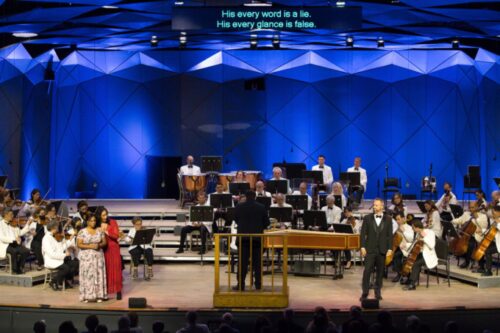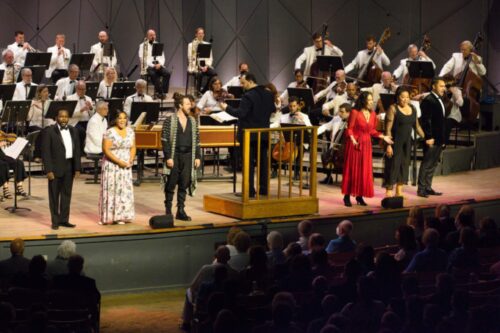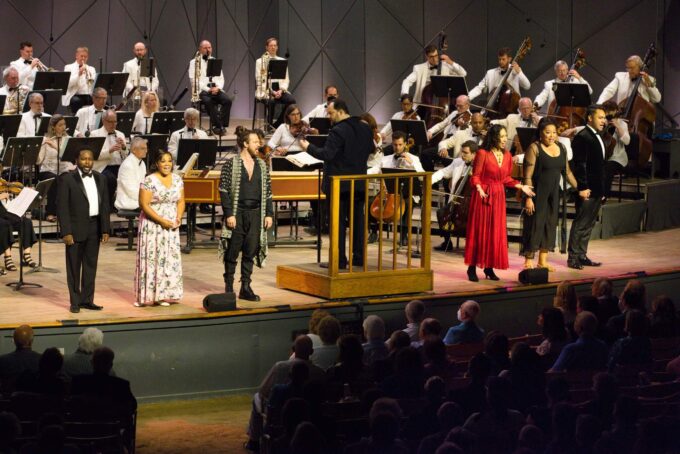
 United States Tanglewood 2022 [3] – Mozart, Don Giovanni (concert performance): Soloists, Tanglewood Festival Chorus (conductor: James Burton), Boston Symphony Orchestra / Andris Nelsons (conductor). Tanglewood, Lenox, 16.7.2022. (CSa)
United States Tanglewood 2022 [3] – Mozart, Don Giovanni (concert performance): Soloists, Tanglewood Festival Chorus (conductor: James Burton), Boston Symphony Orchestra / Andris Nelsons (conductor). Tanglewood, Lenox, 16.7.2022. (CSa)

Cast:
Don Giovanni – Ryan McKinny
Leporello – Will Liverman
Donna Anna – Michelle Bradley
Don Ottavio – Amitai Pati
Donna Elvira – Nicole Cabell
Zerlina – Janai Brugger
Masetto – Cody Quattlebaum
The Commendatore/The Statue – Ryan Speedo Green
Peasants, servants and demons – Tanglewood Festival Chorus
Don Giovanni is a privileged, shameless and narcissistic sexual predator, and the villainous anti-hero of what is arguably Mozart’s greatest, and certainly most dramatic opera. Its main themes – power, class, amorality and justice – are strikingly relevant in the #MeToo era. The Don (even that name suggests a disquieting present-day parallel) combines his social position, guile and deception to seduce and abuse women, only afterwards to deny their accusations. One needs no heavy-handed directorial guidance or psychological analysis to understand just how contemporary are the issues at play. Liberating then, and infinitely more powerful, to experience an excellent Tanglewood concert performance by the Boston Symphony Orchestra and a cast of stellar singers, in which the sole prop is a large tome which records the Don’s 2,065 sexual conquests, and costumes confined to the occasional black eye mask.
What’s more, all the action in seventeenth-century Seville takes place at the front of the unadorned platform of Koussevitsky’s famous Shed, occasionally accessed by a wide corridor carved out between the musicians. With musicians out of the traditional opera house pit, and singers tasked simply with conveying the drama through the words and music, the audience’s imagination is free to roam. In this way the subtleties of Mozart’s masterpiece, in all its comedy and tragedy, complexity and humanity, can be more readily appreciated.

Don Giovanni was superbly performed by Ryan McKinny, an American bass-baritone possessed of a richly coloured and resonant voice and astute musicality. His was a smiling, suave and ruthless Don, a cold-eyed shark in a well-cut tuxedo. Despite an excellent sound system, the acoustical challenges of the 5,100 seat, open-sided Shed can present difficulty for performers. McKinny overcame these problems, powerfully projecting his voice throughout the entire evening, without losing the ability to adjust the volume when called for. He delivered the famous serenade to Donna Elvira’s maid ‘Deh, vieni alla finestra’ (‘Look down from out your window’), accompanied by a delicately played mandolin, while sitting informally on the side of the stage – a particularly beautiful and intimate moment in an outstanding performance.
Baritone Will Liverman’s Leporello, the Don’s loyal but resentful servant, was in many ways the perfect foil to his bullying and feckless master. Small in stature, but blessed with a formidable voice and an expressive face, Liverman charted an even path between clown-like comedy and tragedy, helping us to resolve the central ambiguity which lies at the heart of this work: should we laugh at Giovanni’s misdeeds or cry? It is difficult to suppress outrage at the plight of Donna Anna, who is not merely the victim of rape, but also a witness to her father’s murder at Giovanni’s hand. Vowing to avenge these crimes, Donna Anna was magnificently portrayed by young soprano Michelle Bradley, whose soaring, agile coloratura and impeccable diction brought compassion to a character more often portrayed as starchy and vindictive. The role of Don Ottavio, Donna Anna’s virtuous fiancée, was perfectly sung by Samoan lyric tenor Amitai Pati. His rendition of ‘Il mio tesoro intanto’ – one of the most challenging arias in the tenor repertoire, was deeply moving – a heartfelt and flowing stream of silvery legato.
Acclaimed soprano Nicole Cabell, 2006 winner of the BBC Singer of the World Competition, made a fine, firebrand Donna Elvira, another of the Don’s unhappy victims who loved and was betrayed by him. Her vain attempts to give him a second chance just fuel her anger. Cabell’s even toned, vibrant voice forcefully conveyed the vengeance of a woman scorned, but all that indignation meant that there was little variation of emotional expression which made her otherwise perfectly delivered solo arias somewhat uniform.
Crystalline soprano Jannai Brugger’s peasant girl Zerlina and sonorous bass-baritone Cody Quattlebaum as her betrothed Masetto, were well matched, and introduced an appropriately earthy and humorous element to the social mix. Last, but by no means the least of the singers, was the stentorian bass Ryan Speedo Green as the Commendatore who couldn’t refuse an invitation to dinner. Standing some 6 foot 5 inches tall, Green cut a statuesque figure in every sense of the word, and cast a genuine chill as he summoned an encircling band of crouching demons (drawn from the ranks of the excellent Tanglewood Festival Chorus) to drag the unrepentant Don to his fiery death.
Although the eight soloists are deserving of personal praise, one of the great strengths of this performance was when individual voices melded together beautifully in the comic duets, complex trios and quartets, and the exquisite final sextet. These are moments, when the observations of each character are expressed separately but simultaneously and at brilliant speed, and they were articulated with great artistry and perfect balance. The other strength was the lucidity and precision of the BSO, whose woodwind, brass and string sections were reduced and reconfigured to ensure a degree of historical authenticity. The result was an intimate and collaborative evening under the sensitive direction of Andris Nelsons, where the emphasis was on music-making and all the rest was left to the imagination.
Chris Sallon
